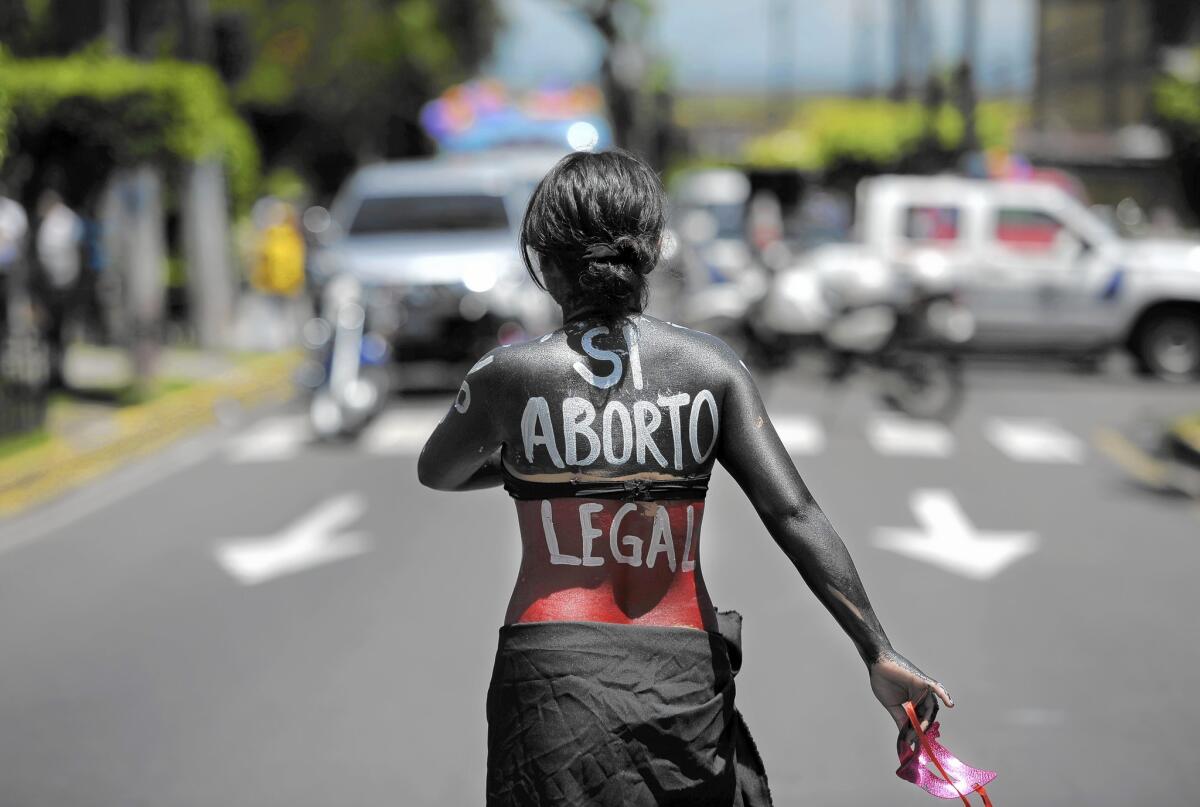Great Read: El Salvador jails women for miscarriages and stillbirths

- Share via
Reporting from San Salvador — When Guadalupe Vasquez became pregnant at 17 after being raped by a neighbor of the house where she worked as a maid, she decided she wanted the baby. She even picked out a name: Gabriel.
Then, on a day in late 2007, pain shot through her back and abdomen. Vasquez says she started bleeding, but her employer wouldn’t let her leave the house to get medical care. Sick in her room and alone, she went into labor.
She heard the baby cry briefly, and then he was dead.
Only then did the employer send her to the hospital, saying she did not want to “deal with two dead in my house,” Vasquez recalls. She passed out, and when she came to, she was handcuffed to the bed at a state hospital.
The rapist was free, but now it would be Vasquez who would go to prison — for seven years and three months.
Vasquez is one of several women in El Salvador who have been sentenced to as long as 50 years behind bars — not for having an abortion, which is illegal in the country, but as a result of miscarriages or stillborn births. In these cases, prosecutors have accused the women of causing the death of their fetus or infant.
El Salvador, along with neighboring Nicaragua and three other countries, has the strictest abortion laws in the hemisphere. Virtually no exception is allowed for the termination of pregnancy, not for rape, incest, malformed fetus or danger to the woman’s life.
Yet the law is being taken to another extreme: imprisoning women who say the loss of their fetus or child was not their doing.
Four days after Vasquez awoke in handcuffs, she was whisked to a courtroom. After two brief hearings, she says, she received a 30-year prison sentence for homicide.
“I didn’t understand what was happening,” said the recently freed Vasquez, who is from a rural village and never made it past third grade. A court-appointed attorney “barely spoke to me. He didn’t defend me in anything.”
::
Salvadoran activists who have taken up the cause of Vasquez and other women have identified 17 similar cases and believe at least 15 more such prisoners languish in overcrowded Salvadoran prisons, alongside gangsters and murderers.
The Salvadoran Citizens’ Coalition for the Decriminalization of Abortion offers even bleaker statistics: 129 women prosecuted between 2000 and 2011 for “abortion” crimes, 23 convicted for having received an illegal abortion and 26 convicted of homicide.
Activist Sara Garcia said Salvadoran laws disproportionately harm women who are poor and uneducated, but also reflect a general “hatred of women.”
“We live in a misogynist, machista society … with prejudices about how a woman should behave and the punishment she should receive for not fulfilling those expectations,” Garcia said. “There is no presumption of innocence.”
The activists and a team of defense lawyers are demanding freedom for the women. Under the banner of an organization called Las 17, they have filed petitions for pardons for the 17 women.
Vasquez, now 25, was granted the first pardon by a bitterly divided legislature. The legal underpinning was that Vasquez was denied due process in her original hearings. Her attorney, Dennis Muñoz, has said she was a victim of a “witch hunt on women.”
Vasquez stepped out of the Ilopango women’s prison on the outskirts of San Salvador in late February.
Cristina Quintanilla, sentenced to 30 years after she had a miscarriage, was released last year by a court, which commuted her sentence to three years, amounting to time served. Another prisoner, identified publicly only as Mirna, was ordered released by the Supreme Court after 12 years behind bars. The court ruled that her sentence for attempted murder was excessive. In her case, the baby had survived.
International organizations including Amnesty International and the United Nations have asked El Salvador to relax its abortion laws, which also result in the jailing of doctors who perform the procedure. The World Health Organization estimates that more than 35,000 women in El Salvador obtain unsafe, clandestine abortions every year.
The irony for some is that two countries with such strict laws, El Salvador and Nicaragua, are run by leftist governments.
In the case of Nicaragua, the explanation is rooted in political expediency. Sandinista leader Daniel Ortega, struggling to regain the presidency after a series of electoral defeats, needed Nicaragua’s powerful Roman Catholic Church on his side. He struck a deal with erstwhile enemy Cardinal Miguel Obando y Bravo, the man who had vehemently opposed him when Ortega was a fiery revolutionary comandante in the 1970s and ‘80s.
With the church’s help, Ortega won the presidency in late 2006, was inaugurated in January 2007, and a year later, a congress controlled by Ortega strengthened Nicaragua’s 100-year-old abortion law to make the procedure illegal in all cases.
In El Salvador, the abortion ban dates to the two-decade reign of the conservative Arena party. In 1998, when the country had only recently emerged from a devastating civil war, conservative sectors of the Catholic Church, including the ultra-right-wing Opus Dei, campaigned successfully for a change in the constitution that declared life began with conception.
An absolute prohibition of abortion has stayed in place even though the leftist Farabundo Marti National Liberation Front won the presidency in 2009 and has governed since. Only in the last months has President Salvador Sanchez Ceren said the matter “needed discussion.”
::
El Salvador’s abortion law gained international attention in 2013 with the case of a woman identified publicly as Beatriz.
Beatriz, a 22-year-old peasant, suffered from lupus and was several months pregnant with her second child when the fetus was diagnosed with anencephaly, meaning it would be born without part of the brain and could not survive. Doctors determined that her own medical condition made carrying the baby to term a threat to Beatriz’s life.
She appealed all the way to the Supreme Court to be allowed to terminate her pregnancy, but her petition was denied, in effect ordering her to carry to term a baby that would not live and might instead kill her. Ultimately, in a de facto compromise, she was given a caesarean section in June 2013, when the fetus was 27 weeks. The baby died five hours later. Beatriz today continues to recover.
As for Guadalupe Vasquez, her seven years and three months in prison changed her world, for good and for bad.
Violent gangs that she steadfastly avoided tangling with in prison now control the rural neighborhood where she lives, as is the case in much of El Salvador — so egregiously that she was afraid to have journalists call on her at home.
At one point, after attention in local media last month, gangsters came to her house asking for her. She had to hide. “It wasn’t like that before,” she said.
On the bright side, Vasquez earned a high school degree while in prison and can aspire to do more with her life than work as maid in potentially abusive households. She is not sure yet what she will do.
“The lawyers helped me a lot, but they can only do so much,” she said. “Now it’s up to God.”
More to Read
Sign up for Essential California
The most important California stories and recommendations in your inbox every morning.
You may occasionally receive promotional content from the Los Angeles Times.











